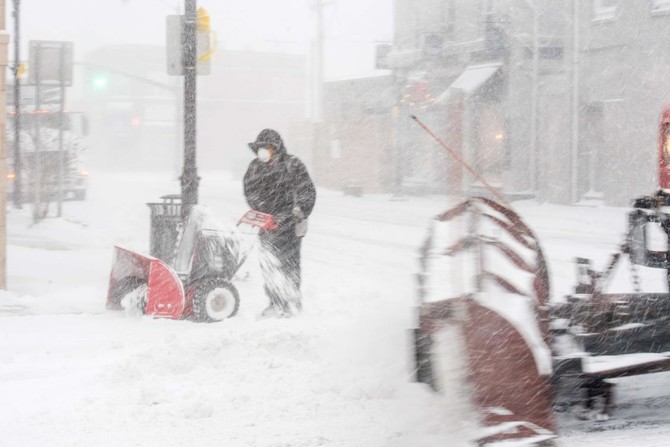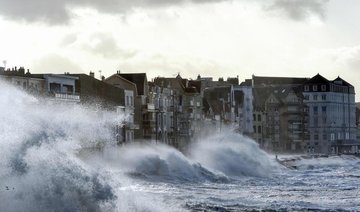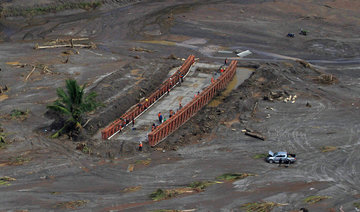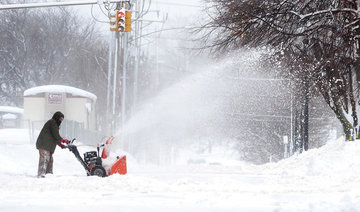NEW YORK/LONDON: An intense winter storm froze pipes and disrupted services at refineries on the US Atlantic coast on Thursday, sending fuel prices higher as heavy snowfall and high winds caused electricity outages for tens of thousands of Americans.
Some 65,000 homes and businesses along the US East Coast are without power, and that number is expected to swell on Thursday as the storm punishes the densely populated US Northeast.
The storm is the product of a rapid and rare sharp drop in barometric pressure known as bombogenesis, or bomb cyclone. Heavy snow pounded the East Coast along a front stretching from Maine as far south as North Carolina early on Thursday, taking out power lines, icing over roadways and closing hundreds of schools.
Prices for heating oil and natural gas in the US Northeast hit their highest levels in years on the back of near-record heating demand. Benchmark US heating oil futures are near their highest in almost three years.
US natural gas demand was expected to remain near record highs this week. Natural gas is the major fuel for residential and commercial heating in the US Northeast and is also widely used by power plants.
On Wednesday, natural gas futures fell 1.6 percent to $3.008 per million British thermal units, but cash prices in New York and New England remain elevated.
“NYMEX Henry Hub prices should rise further to the mid-$3 range, as cash Henry Hub prices already traded above $6. But the market, due to the supposed record-breaking production growth in 2018, still seems to be under-appreciating the potential for cold weather persisting,” Citi analysts said in a note.
New England’s cash prices
“We expect to have sufficient capacity and fuel available and expect to be able to weather the storm without running up against significant emissions limits, but concerns remain the same regarding fuel availability and emissions limits throughout this protracted cold spell and the rest of the winter,” the company said in a statement.
There are fears that a significant disruption could lead to a heating oil shortage, as distillate inventories, including heating oil, in the New England and Mid-Atlantic regions are currently at their lowest levels for this time of year since 2015.
This has spurred tankers carrying diesel and heating oil to set out from Europe bound for the United States to address supply worries, reversing a traditional trade route.
Icebreakers have been used in key ports of Boston, New York and Philadelphia to keep shipping lanes clear, though delays are expected, and the Coast Guard said late Wednesday that those ships will remain at shore until the storm passes.
Reliance on heating oil is highest in the Northeast region, with about 21 percent of households using oil for space heating.
So far, most northern US refiners are not reporting problems. Phillips 66 shut a crude and coking unit at its Wood River, Illinois, refinery after a line froze followed by a brief fire, a source told Reuters on Wednesday. It did not currently have a timeline for restarting the units at the Illinois plant, the source said.
Philadelphia Energy Solutions postponed planned work at its 335,000 refinery complex in Philadelphia until after the storm.
Valero’s 125,000 bpd refinery in Meraux, Louisiana, restarted most operations after sub-freezing conditions froze instruments earlier this week, according to a report by Energy News Today (ENT).
Valero was forced to cut rates at its Port Arthur, Texas, refinery due to the cold weather, ENT reported, and operations are expected to return to normal by the end of the week.
‘Bomb cyclone’ hits US East Coast energy, power supply
‘Bomb cyclone’ hits US East Coast energy, power supply

Somalia president visits Ethiopia in latest peace push

- Mohamud’s office said the visit to the Ethiopian capital Addis Ababa came at Abiy’s request
MOGADISHU: Somalia’s president arrived in Ethiopia on Saturday as the two countries looked to build on a recent peace deal aimed at defusing tensions in the volatile Horn of Africa.
Land-locked Ethiopia’s desire for access to the sea has deepened long-standing grievances between the two neighbors.
Somalia was outraged when Ethiopia signed a deal one year ago with its breakaway region of Somaliland, reportedly to recognize its independence in exchange for a port and military base on the Red Sea.
The diplomatic furor was defused by a peace deal signed last month by Somalian President Hassan Sheikh Mohamud and Ethiopian Prime Minister Abiy Ahmed, which was mediated by Turkiye.
Mohamud’s office said the visit to the Ethiopian capital Addis Ababa came at Abiy’s request.
“This visit builds on the recent agreement reached in Ankara. This renewed cooperation underscores a new era of collaboration between Somalia and Ethiopia,” it said.
Abiy’s X account showed him meeting the Somali president at the airport.
But many questions remain unresolved.
Although Turkish President Recep Tayyip Erdogan said last month’s deal would eventually give Ethiopia some form of sea access, it is not clear how that would happen.
The fate of Ethiopia’s deal with Somaliland is also uncertain.
And continued tensions were on display in Cairo on Saturday when Somalia’s Foreign Minister Ahmed Moalim Fiqi met with his Egyptian and Eritrean counterparts.
The three countries have lately found common ground in opposing Ethiopia’s ambitions and made a veiled reference to their rival.
“The Red Sea and its security is subject only to the will of the countries on its coast, and it is absolutely unacceptable for any country not bordering the Red Sea to have a presence, whether military, naval or otherwise,” Egypt’s Foreign Minister Badr Abdelatty said.
Egypt, Eritrea and Somalia forged a new regional alliance in October at a summit in the Eritrean capital Asmara, and the foreign ministers said Saturday that more would follow.
Shared concerns about Ethiopia have also pushed Egypt and Somalia into closer military ties, with Egyptian troops joining the updated international coalition to fight Somalian insurgents, the African Union Support and Stabilization Mission in Somalia (AUSSOM), that launched this month.
US wildfires pose fresh threat despite winds easing

- The National Weather Service said that conditions in the Los Angeles area would improve through the weekend, with sustained winds slowing to about 20 mph, gusting between 35 mph and 50 mph
LOS ANGELES: The largest of the raging wildfires that have devastated parts of Los Angeles this week was reported to have shifted direction on Saturday, triggering more evacuation orders and posing a new challenge to exhausted firefighters.
Six simultaneous blazes that have ripped across Los Angeles County neighborhoods since Tuesday have killed at least 11 people and damaged or destroyed 10,000 structures. The toll is expected to mount when firefighters are able to conduct house-to-house searches.
The fierce Santa Ana winds that fanned the infernos eased on Friday night. But the Palisades Fire on the city’s western edge was heading in a new direction, prompting another evacuation order as it edged toward the Brentwood neighborhood and the San Fernando Valley foothills, the Los Angeles Times reported.
HIGHLIGHTS
• Death toll rises to 11 with more fatalities expected.
• 10,000 structures burned as neighborhoods turn to ash.
• Thousands homeless, public health emergency declared.
• Insurers face billions in claims, Biden vows support.
“The Palisades fire has got a new significant flare-up on the eastern portion and continues to northeast,” LA Fire Department Captain Erik Scott told local station KTLA, according to a report on the LA Times website.
The fire, the most destructive in the history of Los Angeles, has razed whole neighborhoods to the ground, leaving just the smoldering ruins of what had been people’s homes and possessions.
Some 153,000 people remained under evacuation orders and another 166,800 faced evacuation warnings with a curfew in place for all evacuation zones, Los Angeles County Sheriff Robert Luna said.
Seven neighboring states, the federal government and Canada have rushed aid to California, bolstering aerial teams dropping water and fire retardant on the flaming hills and crews on the ground attacking fire lines with hand tools and hoses.
The National Weather Service said that conditions in the Los Angeles area would improve through the weekend, with sustained winds slowing to about 20 mph, gusting between 35 mph and 50 mph.
Officials have declared a public health emergency due to the thick, toxic smoke.
Pacific Palisades residents who ventured back to their devastated neighborhoods on Friday were shocked to find brick chimneys looming over charred waste and burnt-out vehicles as acrid smoke lingered in the air.
“This was a house that was loved,” Kelly Foster, 44, said while combing through the rubble where her house once stood.
Foster’s 16-year-old daughter, Ada, said she tried to get inside but “I just became sick. I just couldn’t even ... Yeah, it’s hard.”
In Rick McGeagh’s Palisades neighborhood, only six of 60 homes survived, and all that remained standing at his ranch house was a statue of the Virgin Mary.
“Everything else is ash and rubble,” said McGeagh, 61, a commercial real estate broker who, along with his wife, raised three children at their home.
On Friday morning, hundreds of people streamed into a parking lot near the Rose Bowl stadium in Pasadena for donated clothing, diapers and bottled water.
Denise Doss, 63, said she was anxious to return to her destroyed home in Altadena to see if anything was salvageable, but officials stopped her due to safety concerns.
“At least to say goodbye until we can rebuild. I will let God lead me,” Doss said.
Many Altadena residents said they were worried government resources would go to wealthier areas and that insurers might short-change those who cannot afford to contest denials of fire claims.
Beyond those who lost their homes, tens of thousands remained without power, and millions of people were exposed to poorer air quality, as the fires lofted traces of metals, plastics and other synthetic materials.
Private forecaster AccuWeather estimated the damage and economic loss at $135 billion to $150 billion, portending an arduous recovery and soaring homeowners’ insurance costs.
President Joe Biden has declared the fires a major disaster and said the US government would reimburse 100 percent of the recovery for the next six months.
Russia says US risks global energy instability with new sanctions

- “Of course Washington’s hostile actions will not be left without reaction,” said Moscow’s foreign ministry
- Kremlin spokesman Dmitry Peskov earlier told reporters that the Biden administration was trying to leave Trump “as heavy a legacy as possible“
MOSCOW: Moscow on Saturday accused the US of being ready to risk global energy instability with new wide-reaching sanctions on Russia’s energy sector.
The US and the UK on Friday announced new sanctions against Russia’s energy sector, including oil giant Gazprom Neft, just days before President Joe Biden leaves office.
Moscow’s foreign ministry said in a statement that on the eve of Biden’s “inglorious time in power,” Washington was trying to “cause at least some harm to Russia’s economy even at the cost of destabilising world markets.”
“Of course Washington’s hostile actions will not be left without reaction,” it added.
In a reference to the California wildfires, Moscow accused Biden’s administration of leaving behind “scorched earth,” or total destruction, for incoming US President Donald Trump — since he cannot cancel the sanctions without Congress approval.
Kremlin spokesman Dmitry Peskov earlier told reporters that the Biden administration was trying to leave Trump “as heavy a legacy as possible.”
The US Treasury Department said Friday it was designating more than 180 ships as well as Russian oil majors Gazprom Neft and Surgutneftegas, fulfilling “the G7 commitment to reduce Russian revenues from energy.”
Gazprom Neft on Friday slammed the sanctions as “baseless” and “illegitimate,” Russian state news agencies reported.
Biden’s deputy national security adviser for international economics, Daleep Singh, called the sanctions “the most significant” yet on Russia’s energy sector, which he said was “by far the largest source of revenue for (President Vladimir) Putin’s war.”
The Russian ministry on Saturday accused the US of seeking to “hinder as far as possible or even make impossible any bilateral economic ties, including with US business.”
It said Washington was “sacrificing to this the interests... of European allies,” which are “forced to switch over to more expensive and unreliable American supplies.”
It also accused Washington of “ignoring” the views of its own population on rising energy prices once the presidential election was over.
Two trams collide in France’s Strasbourg, 20 injured

- The trams collided near Strasbourg’s rail station.
- A large security perimeter has been set up in front of the station
STRASBOURG, France: Two trams collided in a tunnel in the eastern French city of Strasbourg on Saturday, injuring at least twenty people, the authorities said.
Strasbourg was the first major French city to re-introduce its tram service, in 1994. Since then, there have been no major accidents.
“Twenty people” have been injured, said a spokesman for the prefecture, citing a preliminary estimate. He added that the cause of the accident had not yet been established.
The trams collided near Strasbourg’s rail station.
A large security perimeter has been set up in front of the station, where numerous ambulances have taken up position, according to an AFP journalist at the scene.
A video posted by a witness on social media shows a chaotic scene with the two trams significantly damaged in the tunnel near the station.
One of the trams appears to have derailed as a result of the impact.
Syrian migrant dies trying to cross Channel: French authorities

- Several dozen migrants tried to get into the water on the beach at Sangatte, on the northern coast of France
LILLE: A 19-year-old Syrian migrant perished while trying to cross the Channel to Britain, French authorities said on Saturday, adding he was probably crushed to death in a leaking dinghy.
It was the first reported death at sea of a migrant seeking to travel to Britain from France so far this year.
Several dozen migrants tried to get into the water on the beach at Sangatte, on the northern coast of France, on Friday night, the Pas-de-Calais prefecture told AFP.
The prefecture said that “a few minutes later” the group disembarked from the leaking dinghy. On the floor of the boat, a Syrian man was found, the prefecture said, adding that he had suffered cardiac arrest.
He had “probably” been crushed to death.
“This was the first death at sea in 2025,” the prefecture said.
The victim, 19, was pronounced dead at 5:24 am, the Boulogne-sur-Mer public prosecutor, Guirec Le Bras, said separately.
A forensic investigation will be carried out to determine the exact cause of death.
Citing members of law enforcement, the prosecutor said the small boat carried around 60 migrants.
A 33-year-old Syrian-born man was arrested and placed in police custody, according to the prosecutor.
According to the prefecture, 77 people died trying to reach Britain in flimsy inflatable boats last year, making it the deadliest year for migrants who are taking ever greater risks to evade Britain’s border control.
Associations providing help to migrants recorded 89 fatalities last year. The count includes migrants who died at sea and on the coast of northern France.
The groups planned a march in Calais on Saturday to denounce security policies they say are responsible for the mounting death toll.
Due to unfavorable weather conditions, only 61 migrants arrived in the United Kingdom on small boats between 1 and 10 January, according to British authorities.
More than 36,800 people were detected crossing the Channel last year, a 25 percent increase from the 29,437 who arrived in 2023, according to provisional figures from the interior ministry.
Immigration, both irregular and regular, was a major issue in the UK’s July general election, which brought Labour to power but also saw a breakthrough for Nigel Farage’s hard-right Reform UK party.
According to Downing Street, illegal migration was one of the issues discussed by French President Emmanuel Macron and UK Prime Minister Keir Starmer on Thursday.






















